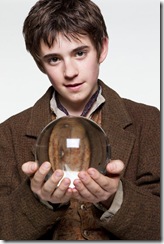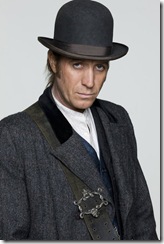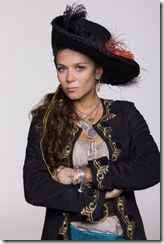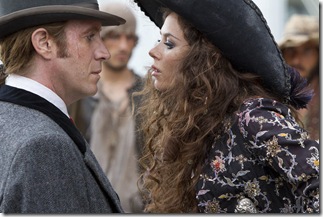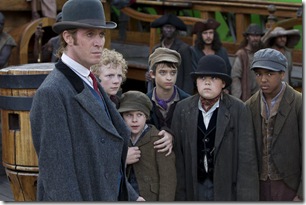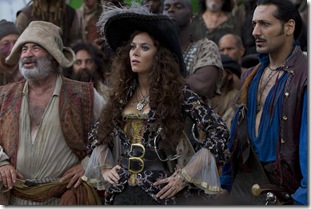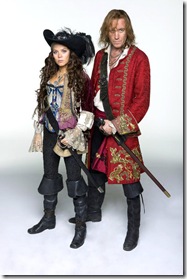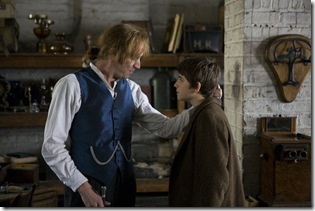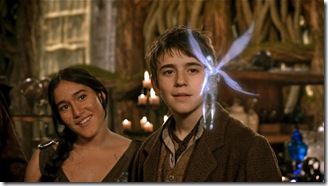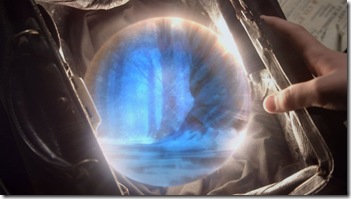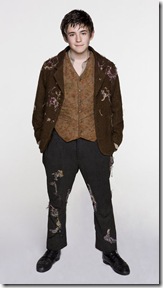Say what you will about Nick Willing’s work in miniseries, they’re always something different. In Neverland [Syfy, Sunday, December 4th/Monday, December 5th, 9/8C], Willing takes a remarkable cast [Rhys Ifans, Charlie Rowe, Anna Friel, Bob Hoskins…] and tells the tale of how Peter and the Lost Boys came to be in Neverland; how a Fagin-like Jimmy became the pirate Captain Hook, and how Neverland became inhabited by pirates, Indians and fairies.
Recently, Willing, Ifans, Rowe and Friel talked with journalists/bloggers about the Peter Pan prequel. Here’s what they had to say.
Anna, I wanted to ask you. When you grew up, were you a fan of Peter Pan? Did you think about it much? And when you thought about it, in your mind, did you think about that you’d be playing Wendy or playing Tinker Bell? How surprised are you that you’re playing the Captain – the pirate captain?
Anna Friel: Yeah. I’ve grown up with the story. I’ve seen it in many version and watched all the films and having a six year old daughter, encourage that much more cause she’s a musket fan. And I love the new take on this story and the introduction of a very new character. And Wendy was never my favorite and apart for her, there were never any female roles to be offered in this wonderful story so I was very grateful to Nick for creating one.
Rhys, you’re quite a swordsman in this thing and were you originally or did you have to learn the sword play for the part or had you picked it up already?
Rhys Ifans: I’d kind of done it many years ago in (unintelligible) school and there were several injuries so I wasn’t – I wasn’t a great swordsman but I can – I guess (unintelligible) it was really exciting to fight, you know, Anna and Charlie and yeah. It’s quite a fill and you know, initially it took some time to pick it up again but, you know, as the shoot went on, rehearsal times got less and less and less. So it’s more of a dance than a combat.
And just I should ask you too the same thing about did you grow up as Peter Pan fan? Had you thought about playing in Peter Pan some time?
Ifans: Not so much the novel but I was, you know, familiar with, you know, the many kind of variations and gazes that the story was being presented to us over the years be it on film or on the stage or, you know, (unintelligible) feature.
So yeah. I think you know everyone in the western world has been touched by Peter Pan in some way in their life. So yeah. It was kind of a thrill to have a lot explained as Nick has so eloquently done in this film.
My first question is for Nick. What made you decide to kind of write a prequel rather than do say a remake or whatever? What, like what – how’d you come up with the idea?
Nick Willing: I’m interested in the – I was interested in the genesis and how it is that a boy doesn’t want to grow up and I was interested in how it is that it ended up in a place called Neverland and what that was and why there were pirates and fairies and Indians there. I was just – you know, when I read the book I loved it so much that my imagination ran wild and I kind of wanted to know more of the facts story and I thought that would make quite an intriguing movie.
Awesome. And for the rest of you, how did you become involved in the project?
Friel: Charlie, you go first. It’s your story.
Charlie Rowe: Well I mean I’ve worked with Nick a long time ago on my very first job when I was nine and so the minute I heard that he was directing and he’d written this, I was – I just wanted to get involved so originally I was going up for the part of Fox, Peter’s best friend. And I went out for that and I wasn’t too keen on it.
And then I read the script and I was like mum, I just really want to go out for Peter and then the next day Nick called and was like I want you to go for Peter. And so that was just absolutely amazing and I got the part eventually and I’m so glad I did. Thank you very much Nick.
Willing: Yeah. I knew he was good but – because I had worked with him before, I thought I can’t work with him again. I’ve got – there must be some other kid out there. I must have seen 400 kids and then finally right at the end he walked in for Fox and I went ah, shit. That’s Peter Pan. So it was – I should have gone with my first instinct, you know.
((Crosstalk))
Friel: I (unintelligible) loved it and it was one of the best things I’d read. I loved the whole fantastic element of it. I loved the idea of playing a baddie and then a female baddie and introducing a new character. So it was great stage with which to write, and I had a conversation with Nick on the phone and he spoke so eloquently about the story and what he intended to do with it and how to work within that (unintelligible) and how he could make that world become true and told me that it would be one of the most fun shoots I ever did and it ended up being that.
Ifans: Yeah. And I’d like to reiterate what Anna said. You know, I hadn’t met Nick. I was sitting in a bar in a beautiful village in Spain and I received this script and read it in one go and that’s kind of my measuring stick for any, you know, for any script. It’s if you don’t put it down, it’s worth considering and then Nick pretty much said the same to me that it would be a, you know, a joyous (occasion) telling a beautiful story and a story that explains another story that we’re all familiar with.
And I just from a personal level – the Hook – Nick’s version goes a long way into describing the Hook we see in the novel into this – painting his psychosis and, you know, his arrival at the embodiment of evil.
Thank you all so much for talking to us today. Our first question is for Nick and we just heard from the actors how they got cast but could you talk to us – you have so many incredible cast members. Can you talk about the casting process and also if you wrote the story with any actors in mind?
Willing: I wrote – the part of Hook I really wanted Rhys from the beginning. And even when that – because the thing about Rhys is that he’s – he does – he’s one of the few actors that is incredibly powerful and imposing on the screen but at the same time shows a certain vulnerability.
And Hook to me – if Hook as villain could seem vulnerable, that would be cool I thought. And so I kind of had in my mind this tall figure or Rhys I have to admit.
Anna too was – funny enough was also – I know it sounds weird but also – in fact, when I cast a movie, I always think who would be the best person and I just try and go for them, you know, and if I don’t – and if I get them, that’s fantastic. I’ve always been very lucky with this.
Bob Hoskins too I thought I’d love – I mean because I’ve seen him obviously in Spielberg’s version. To me he was the embodiment of Smee. I couldn’t think of – I couldn’t get him out of my head when I was writing and I always imagined that he’d be perfect for Smee and indeed he said yes. I mean I was – so I kind of got three hits.
And then with Charlie, I’ve just told you that story. It turned out to be perfect. So we were very, very lucky or at least I was very lucky to get all the people I kind of dreamed of and it’s proved to be, you know, true.
I mean one of the things about making this film was that it was quite a collaborative process in all. You know, you’ve got to get (unintelligible) – there’s a little kind of team and working with these actors are perhaps one of the better experiences I’ve ever had.
That’s great. And for Rhys, Anna and Charlie, can you talk a little bit about the challenges of putting your mark on characters that people are so familiar with.
Rowe: Yeah. Well I mean I actually – it was my first proper big part and I was just more scared about actually being any good at acting. But I was lucky on set to have Rhys and Anna who really taught me a lot – just taught me a lot. They were – I’m very grateful for that.
I felt that I went into doing the show as just a little kid really, a little child actor, and I think I’ve come out as an actor; or I’d like to think so anyway.
And also I – looking at Nick and being around Nick all the time, I realized that he was actually – he was this character Peter that he’d written about. So I just used to look at how he was behaving and just replicated it really.
((Crosstalk))
Friel: Nick’s really set the tone for it also and he wanted individual and unique performances because it was part of the story that we’d never heard before and particularly from my character; she’d never – she was completely created and invented and it’s always hard to play or accept a character to play that people will maybe not like and to play it badly. And Nick and (Unintelligible) may go as far as you want with that and we had a great rehearsal process in which Rhys and I played around a lot.
You know, the different characteristics and how those two came together and what made Hook be intrigued by this incredibly powerful woman who used her prowess and her femininity to get what she wanted.
Ifans: And you know I think just to pick up on what Charlie said, both Anna and I have said and I’m sure Nick would agree, that I was not working with a boy. I was working with a professional actor from the very beginning to the very end and then I can put my hand to my heart and say he is one of the most professional, eloquent young men I’ve ever, ever worked with so that was a pleasure from the (oft).
Rowe: Thank you very much.
Ifans: I think his performance, you know – you’re welcome. And you see him – not only did he – you see the character he plays become – you just see this huge change in the character he becomes. He develops and gets all these new sort of addled emotions and struggles with, you know, the morality that Hook and Bonny present him with and I think it’s a really, really mature performance.
So throughout, you know, between him, Anna and Nick, I felt in the safest (hands) I’ve ever felt.
I just wanted to ask Nick to follow-up and add a little bit. I was fascinated when Charlie said that Nick really is Peter in some ways.
((Crosstalk))
Yeah. What things about Peter do you associate with – that seems like they’ve hooked you for a long time? What is it about the character?
Willing: Well first of all I should say that I’m a bit older than Peter.
Yeah.
Friel: No, you’re 18 Nick.
Willing: Physically. I’m 17 – yeah. I was going to say in my head I’m still very much 17 so I – you know, in my story one of the things that interests me about growing up is how you at certain vulnerable ages look for your heroes and in men to emulate. And they’re not usually the heroes that you’re supposed to follow, you know. And that is part of the nature of growing up. And I was interested in telling a story about a little boy who wants to grow up and emulate his hero.
But what if your hero isn’t quite grown up himself? And still has a hankering in his past and it’s something romantic and so on. So that was kind of – that to me resonated because even though I’m 17 and all grown up, I’ll still feel like, you know, I’ve got to still discover the things – I’ve got to enjoy the world and discover what it is to be grown up. So I kind of – I suppose I don’t – I try not to identify with Peter Pan but unfortunately it turns out that I probably am quite a bit like Peter Pan.
I have a question for Nick. I wondered why if you can talk a little bit more – you said about how you, you know, you first got the idea and it sounds like it was quite a long time ago.
So if you could say how long you’ve actually been working on this project and also why you started to do it for television and not as a, you know, as a movie – a big screen movie because it seems to me that, you know, the film has all those kind of production values that one might expect in a movie so I wondered what the thinking was around that.
Willing: Well it – one of the things about doing it for television and particularly working for the Syfy network as I did is that they allow me to take great risks and experiment and try new things and they also are brave enough to go into dark areas which sometimes it’s more difficult to do for the big screen.
I mean one of the things about working – if this was a big movie I think I’d wrestle with 50 – 60 – 100 executives just to write the script, let alone make the movie. And one of the things that I felt in making this movie is an enormous amount of freedom and that freedom comes from working with the Syfy network in particular, but also working in television.
Television currently in America I feel is a medium that is taking the greatest risks and trying new things. And so that’s one of the reasons I did it for TV.
And how long have I been thinking about it? I mean I started ever since I read the book in one way. But only in the last couple of years have I had the confidence to take on such a massive thing. It is, you know, it is a very famous and loved book and so it’s only since I’ve become a bit older and, you know, made films like Tin Man and Alice. These are the films I’ve made recently. But I had the courage and confidence to take on something of this size, magnitude.
So this is actually a follow-up on that Nick. So you’ve worked on all of this Syfy films based on literary classics which all have huge, hard core audiences. Do you ever get input or feedback from those hard core fans of the books?
Willing: From the hard core fans of Peter Pan you mean or…
Yes.
Willing: When I was writing the script. I didn’t get much feedback. I didn’t know where they were. I didn’t know to get in touch with them. I suppose I should have put out a – no.
I mean the thing about writing is that it’s very, very difficult anyway. I find it very difficult. And it takes a lot of – it’s a struggle and you have to keep rewriting and rewriting and rewriting and so you have to have a very clear vision and direction and focus. It’s very – if you have too many influences, you kind of get lost I think; or at least I do.
Now do you have any favorite aspect of the original Peter Pan book that you were able to explain the origin of in this film?
Willing: I particularly was taken by the relationship between Peter and Hook and that was the thing that in this film I – well with Rhys and Charlie and in fact Anna is an enormous part of that.
One of the reasons I wanted to create a character like Anna the pirate queen you see in our film is tough, slightly crazy, extremely dangerous, nasty but you want her. She’s irresistible. It’s a quite difficult part to cast but Anna is absolutely perfect in that role.
And one of the – so one of the things that I was most interested in is how it is that the relationship between Peter and Hook came about.
I cannot tell you how much I love this program. Nick, I love (Cuman) in Alice and watch them every time they’re on but wow. Neverland is an absolute treasure so thanks to all of you for your part in this project.
I’d like to find out actually from each one of you what’s your most favorite and least favorite thing about working in the fantasy genre?
Friel: The most exciting was having a real ship to work on. I loved the aspects of it. Go on.
((Crosstalk))
Rowe: And I think my favorite aspect of it is the fact that you can just create magical things and mesmerizing and unforgettable creatures and worlds and just beautiful, beautiful things. But I suppose my least favorite is just the color green.
Friel: Yeah.
Willing: That’s very funny.
((Crosstalk))
Friel: And the fact that we started off in a real environment, on a real ship. We were able to suspend all disbelief much more easily when we came to work and on so much green screen and also Nick really cleverly gave us fantastic visuals of what we would be seeing and what we’d be looking. So it was kind of like being a child in the most fantastic dress up box you could ever imagine or wish to have and it was all about play – what we do.
Willing: Yeah.
Rowe: My favorite (unintelligible).
((Crosstalk))
Ifans: For me too. It was just the – just the whole transporting feeling that making the film. We shot it in Ireland so we felt kind of far away from everything. We felt pleasantly isolated and left alone so we were able to indulge and invent this just absolutely, you know, this visual banquet that Nick’s created. And you know really indulge that and play in it.
And, you know, the thought and just knowing that no one’s going to have to leave the comfort of their own home to be transported to such a magical place and I think that’s what the novel does.
You know, when you read the novel, it very much happens in a household and a bedroom and living room. You know, that’s the kind of emotional HQ. And I think that’s what – just to go back to what Nick said before about television. Also doing it with television, it offers you more time to explore.
I don’t think if we’d have shot this – if this was a 90 minute movie feature, we wouldn’t have been able to explore half the psychological dynamics that Nick has been able to in, you know, in a TV three hour epic.
You know, so it was just a thrill just from beginning to end.
Willing: Yeah. Yeah. I mean I have particularly enjoyed working on this film. I had more fun than I’ve ever had working on a movie.
But I think the thing that I would – the thing that I love about doing – I’ve done a few fantasy films and the honest answer to what it is that I love most about the nature of fantasy movies is imagining worlds. Imagining new worlds – the wonder of feats that you could walk into some of these extraordinary places. That’s what kind of keeps me going is sort of – the thing I hate most on the other hand is how expensive that is and how difficult it is to achieve often and how sometimes it has to be done on a green screen and so on but the end result, if it works out, is what fills us with the most pleasure.
And you can’t do that with any other medium. Fantasy is the only thing which allows you to invent and create and imagine worlds that are not there fully.
Anna, you know, obviously a lot of people know you for your great work on Pushing Daisies. With that and with Neverland, you know, obviously you were given the opportunity to build these great characters sort of from the ground up. Is that preferential for you as an actress or would you rather have a little bit of back story?
Friel: Well I think when you’re given something new it’s always exciting because you’re the first one to do it so you’re not having to live up to any expectations or be compared to anyone who’s ever done it before. You know, there’s pros and cons for both of them.
You can watch the Peter Pans or watch the Hooks and try and do variations on them which I think in this case needed Rhys or Charlie did. They completely did their own invention of age old characters in storytelling but for me, I always like a challenge. And I like to have things that excite me and is something new and a little bit of a fox to be taken and I’ve never played a character like this before.
As I said before, it’s always hard playing a character that people necessarily won’t like and that’s usually done – is a role and the job of Hook. And I think that the fact that Nick wrote a very complex Hook and gave him a back story and where did his dark side come from and to be influenced by a woman I thought was quite an interesting thing to look at.
All right.
Friel: Is that – does that answer your question?
Yes, very much so. Thank you. And Rhys and Charlie, for you guys, I mean conversely you know when you do take on these very iconic characters, what sort of is the dichotomy or how do you sort of break it down between your level of excitement and is there any sort of level of intimidation perhaps?
Ifans: Well in Hooks case the boots that you have to fill are literally big because they’re, you know, there have been so many Hooks and each and every one of them has worn big boots.
Friel: I took your hair thank goodness Rhys. You didn’t have the original Hook hair. Bonny got that look.
Rowe: Bonny got good curls this time.
Ifans: It wasn’t intimidating. It – because it was a back story, I kind of you know just (unintelligible) over maybe every other Hook throughout history had been thinking of subtextually. So I just played everyone’s subtext and so and I hope they’re grateful for that. It was really hard work.
Rowe: Yeah. I am – I would say extremely excited when I got the part. You know, danced around my house for ages. But I was hugely nervous of the fact that every single boy and girl around the world had grown up with this magical story and every boy has played with their wooden swords in the playground with their best friend being Peter Pan and Captain Hook. And so you know like Rhys, we both had huge boots to fill and I was very nervous about it.
I mean I hope people like the character that I’ve tried to create because I don’t – as Anna has said before, this isn’t – it’s not just – he isn’t Peter Pan this boy. He’s a completely new character that we’ve never seen before and yeah. I hope I did him justice.
Nick, in your own words, can you explain what your kind of place of Neverland is and what it’s about?
Willing: It’s a story of who – where Peter came from, who he was. Where the Lost Boys came from, how they ended up in Neverland and what Neverland is and why it’s full of pirates and Indians and fairies and crocs and why it’s magical and why it is that Peter doesn’t want to grow up.
And to turn to you Anna, Rhys and Charlie, can you explain in your own words who your characters are what their roles in the particular adaptation are that you play?
Ifans: Well I would say that Hook is a damaged man who is liberated by badness.
Friel: And Bonny is a very bad woman who’s liberated by Hook.
Rowe: I think Peter’s just a boy who wants to – just a boy who wants to live really and be – I suppose be incredible. He wants to be Hook and that’s why going to Neverland is so interesting because of the whole aspect of not being able to grow up.
Ifans: Good answers. Wow.
Friel: Do you want more detailed answers or is that enough. We kind of gave one liners there. That’s not fair for you.
Willing: That’s really good. No. That was good answers.
Nick, you know, after reimagining both Alice and Wizard of Oz and now with Neverland you’re adding to the (solidity) of Peter Pan. Do you have a preference for recreating or reimagining these stories or (unintelligible) Peter Pan which is kind of fleshing them out more?
Willing: Well they’re all very different – similar but actually for me. Hello, can you hear me?
Friel: Yeah. (Unintelligible).
Willing: Okay. They’re all very difficult for me these films. The Tin Man which was the Wizard of Oz was more a kind of reimagining of that world in a modern setting. Alice was me going crazy and creating my own story around what I imagined Wonderland would be like today 150 years old.
While this is the first time I’ve really tried to do a more traditional prequel to a fantasy story that is – could be plausible – a plausible part of the mythology of Peter Pan. And so it was – they were all daunting because they’re all incredibly revered stories.
But one of the things I think people appreciate is that if you keep that story alive, keep reinventing, keep trying something new, keep making up your own stories around that famous story, then you always go back to the famous story itself and you keep that something that we all treasure alive for longer. That’s kind of how I see it.
And would you – you know, are there any other classic stories you’d want to adapt or would you have any interest in – assuming that Neverland does great, would you want to actually do Peter Pan proper with this cast?
Willing: Why? You’ve got some money? We’ll give you a pretty good deal. You – I’ll give you a very good deal.
I don’t think I’d go back to Peter Pan because I don’t know. I don’t think – I don’t know that I could find – you know, I don’t know. I mean I don’t think so. But there are other stories that I’d love to explore – other worlds.
I mean you’re talking to a guy that actually lives in a fantasy world. In my case, I live in many fantasy worlds. I live in Neverland, Oz, Wonderland. So I just, you know, for me it’s an intense and vicious pleasure and the longer I can live in the fantasy world, the better for me.
Friel: It feels like (unintelligible) genre. You know, that there were vampires for the last few years and now it feels that the reinvention of fairy tales are coming too. And everyone’s got a fascination with the retelling of those stories. I don’t know (Unintelligible) to name but a few and also the love of the prequel now because the story – what came before, where was the writer’s head when we arrive at the beginning of these wonderful stories.
My question is for Anna. What were some of the challenges involved with playing a female pirate captain that was so watchable and likeable but still had her kind of tough edge and still wasn’t going to take crap from anybody?
Friel: Oh, I love that you said watchable and likeable. That’s good. I did suppose I did my job if you think that.
Get into really tight, tight leather trousers everyday and those corsets. I’d say physically that was the hardest thing and learning to use a sword as being – and wrapped up in that tight corset. Being on the – what they call it when we did – you know, we hung from on the – it’s wasn’t a trapeze. No.
((Crosstalk))
Friel: The harnesses. At least I didn’t have to fly. I know that must have been the hardest thing for Charlie. I didn’t have to fly.
I don’t think – I don’t look back at these scenes and think of anything being hard. I just found it fantastic fun. Maybe with the wind machines keeping the musket hats on. (Unintelligible) – it was just – I have nothing but really fond memories of it and I don’t know. I feel like the remaining likeable wasn’t really kind of – wasn’t my aim. It wasn’t really something I had to do. It was just becoming the character and finding an action that made us feel that she came from the 1700s.
And also I think my biggest question to Nick – when I accepted it I said but how am I going to be believable as small as I am that I’d run this ship surrounded by these huge, massive burly men. Who’s going to take me seriously?
And Nick said well go online and research female captains and pirates and I did and came across a wonderful one called (Granuale) who I’ve since become kind of obsessed with. And it’s a story that we don’t know but at that time so, so many years ago, women did – there were certain women who ruled the seas.
I’ve got a few questions. I just want to ask Anna first could you tell us a little bit about your role of Captain Bonny – the pirate queen and she’s completely a new character. I’m just wondering what you can give us about or (unintelligible) about the story.
Friel: Have you seen it?
Unfortunately no. I’ve only seen a trailer and it looks really interesting ma’am.
Friel: Well I think if – I’m not passing the buck but I think if I hand that question first of all to Nick who created it, he will answer it far more eloquently and articulately than I and then I will tell you the bits that I feel but he created the character and I think Nick it would be nice for you to explain why you chose to create Captain Bonny and I’ll say what I did to embody that.
Willing: Okay. Very briefly Captain Bonny is an incredibly beautiful, vivacious rather nasty, slightly twisted and irresistible captain of the Jolly Roger. You probably think that the captain of the Jolly Roger was Michael James Hook but no. It’s – it is actually this rather extraordinary woman.
And to find out why it is that she is the captain of the Jolly Roger and how it is that Hook becomes eventually its captain, you have to watch our movie because our movie is about how it is that all these people became the people we know and love; it’s a prequel.
And – but Anna – I have said that Anna does it – does an amazing job of bringing her to life. Incredible. And one of the roles of Captain Bonny in our film is to be the conduit, the trigger for liberating Hook from the repressed Edwardian gentlemen that he starts out as.
Friel: And let me – (unintelligible) the Captain. She was a woman who’d been stuck on a ship with the same 20 men or 25 men; however many – so two per 100 years or more. And when Captain Hook arrives he’s like a God that’s come from the sky and she wants all his knowledge.
She’s a very smart woman and has a great understanding of astrology and I think makes a great captain but she becomes instead greedy and wants more and more and more and I think doesn’t want to go back to her old life because she won’t have the power that she’s discovered being in Neverland.
And I’ve just become fascinated with female pirates. I think it’s a more fantastic thing today. If I could go back in history and be anyone, I’d be a captain of a ship. Thanks very much.
I’ve got another question for Nick actually. One thing I noticed from you in the trailer about Rhys was the relationship between Peter Pan and Hook. It doesn’t start off as adversarial and you know I’m interested in knowing what – in learning what made you use as a starting point that they’re not (unintelligible) adversaries.
Willing: Well Hook is – for me I was interested in – I mean maybe I should pass this to Rhys because I know he will say it better than I could possibly say it but I was interested in Hook as a boy also – as a character with a sort of Peter Pan syndrome who had yet to grow up.
And the relationship between him and Peter who looks up to him and wants to be like him and who admires him enormously as a role model. And how in the gradual deterioration of that friendship – that relationship and friendship because Hook wants things that aren’t always right for the world and for Peter and how that relationship damages Peter to the point where he is the boy who doesn’t want to grow up.
That to me seemed like quite a good story to tell. And it seemed like a modern story to tell. I mean I suppose it’s universal. It will always be told. But the idea that we aren’t always initiated in the way that we should be as men.
That’s about it. What do you think?
Ifans: Yes. It is. I think from what both Hook and Peter are presented with when they arrive in Neverland is the prospect of eternal life. And when you see he is in many ways a lost boy but a grown man. And it was just interesting to explore what, you know, the offer of eternal life does to a boy and what the offer of an eternal life does to a man.
I think it makes a man greedy because a man is – a man is closer to death than a child. So eternity to a child offers goodness and eternal life to a man is essentially corrupting because it involves a certain amount of vanity I think to embrace it.
Friel: And has any story ever before explained why Hook despises Peter so much. I don’t think it has. That’s what fascinated me with the script is that you get the story before.
Which therefore lies the prequel. Why does this man hate this boy so much? In this case, he doesn’t hate him. He’s just very torn.
I think it’s a great arrival at the story that we all know. That’s what I found most fascinating is – is that you cleverly did Nick. Is giving that back story of what was the path between them and you’ve created that really beautifully.
((Crosstalk))
Ifans: It’s something that works on very – on a very modern level, you know. To, you know, father – son relationships and also the way that, you know, that Hook grew up in a very, you know, repressed, sexually repressed Edwardian society and what Captain Bonny offers him is total and utter sexual liberation, you know. And when you give that to a man, everything else falls by the wayside, including their friends sometimes.
Nick, you mentioned earlier being really, really fixed on having Bob Hoskins play Smee again after seeing him play Hook in Hook. What was the process in getting him to come back to that character and how different is this version of Smee compared to the other version?
Willing: Well it was very easy to get Bob to do it. In fact, he said oh, good. I’ve done all the research already. So he was really up for it.
The – is he very different? He is a bit different from the other Smee. My Smee or this Smee is the ship’s captain and he’s a lover of fine cuisine and he sees the lost boys as a very good, new source of fresh meat.
And so he’s not quite the same Smee. I mean these evil characters are all evil. I think one of the things I wondered and thought was delicious about the book, the original book, is how Barrie made all his evil characters funny and accessible and, you know, would make jokes as they’re killing people. I found that incredibly macabre and rather delicious. So I kind of tried to do a version of that with some of the other characters like Starkey and Smee obviously.
But the thing about – the wonderful thing about Bob Hoskins is that as soon as you see him on screen, he’s like seeing a very old friend, a cuddly old friend. He is actually very cuddly in real life – it has to be said. We all cuddled him.
But when you see him, he looks like this really sympathetic sweet, generous person and to make him a vicious pirate seemed totally appropriate.
Did you have any involvement from the Barrie estate when you were putting this together initially?
Willing: No. I don’t – I didn’t have any involvement in the Barrie estate. I mean the one I would have liked to call is Barrie himself. But unfortunately, of course, he’s no longer with us but I’d love to be able to call him and say hey, what do you think? But we’re always doing this of course and we’re always creating vivacious, variance on famous stories; you know, whether they be Shakespeare or the Greek myths and it’s always keeping them alive for us.
I have a quick follow-up to that last question which was did the Barrie estate – did they have to approve this project before it was made?
Willing: No. No. I don’t even think the – the books is in the hands of the Great Ormond Street Hospital; the original book was donated.
So there isn’t really a creative voice as I understand, you know, to approach. But we did obviously approach the Hospital and we donated a large sum of money to them even though the book is technically out of copyright now and they no longer hold the rights to the original book.
They – we still, you know, as a gesture of appreciation and good will.
Erica Rubin [Syfy]: Nick, can you – we can’t hear you. Are you – can you hear us?
Willing: Can you hear me now? Did you…
((Crosstalk))
Friel: I lost you too Nick.
Willing: When did you lose me?
((Crosstalk))
Just after you had donated to the Hospital.
Willing: Yes. I don’t believe there is creative voice as such that you can approach and ask about the story and the book but we did approach the hospital and we donated a large sum as a gesture of appreciation and good will but that’s kind of – that’s what we did but we didn’t – I don’t know anyone else to contact, you know, because the estate – there is, you know, it belongs – the book belongs to the hospital.
Oh, okay. Thank you. And my question was for Rhys. Rhys, you were brilliant in Anonymous and as an actor do you enjoy more doing a period – more of a period film than modern day?
Ifans: Well, the – you know, the joy of the period film, you know, is not your take into another world, you know. And the, you know, and the costumes also I think in a period piece determines, you know, the way you move and consequently the way you breath and when the way you breath effects the way you think. So it is always kind of a more of a transformation.
And especially in this case and I guess in Anonymous, you know, it is you know joyous for any actor to, you know, enter other grounds of consciousness and thought and that’s always, you know, at the end of the day we just like – we all like dressing up and playing around.
You guys started to kind of talk about it a little bit but I specifically wanted to know if Charlie, could you talk about kind of the stunts you did; especially the flying and everything. Was that hard or?
Rowe: Yeah. Well I mean – well, I don’t think it was hard. I was just in complete heaven. I was jumping around with swords, sword fighting with Rhys and Anna Freil and I was just – I was – it was strange and obviously the flying was absolutely amazing being hauled up and down in this cold warehouse. It was spectacular although it does hurt. I really do not recommend it.
((Crosstalk))
Friel: You practiced – all I have to say on Charlie’s behalf – he practiced that all the time at the end of a very, very, very long day of shooting. Sometimes 13 hours. He’d be there in his little (unintelligible) wrapped (unintelligible) in the harness and the same with the whistle. I’ve never seen such a hard working young person.
Rowe: The whistle. God, I miss the whistle.
((Crosstalk))
Rowe: Sorry.
((Crosstalk))
Ifans: After all that harness work, your voice is still dropping. You will be a man very soon. Don’t you worry.
((Crosstalk))
So you played the whistle yourself, too, then?
Rowe: Oh yeah. Yeah. I had a penny whistle which I played – which I play many songs on during the film. And you know everyone thought it was great at first; the fact that I was learning it and I learned many, many songs but I think it became a nuisance by the end. You couldn’t get it off of me. I was always with my whistle just playing irritating music.
That’s great. And then lastly for all – for the actors, when you were in the film and obviously you couldn’t see what it was going to be. I know you said you kind of were shown some things but was it – when you finally saw the outcome, was it what you expected? Like how did you feel about the results of all the effects and everything?
Friel: In absolute honest, I think whenever you’re doing film for television, you look at the budget that you have which is much more constricted than a movie budget and you think God, are they going to be able to do what they say they are. And I know that when I sat down to watch it certainly I was absolutely blown away and the number of effects on it with a TV budget is just they’ve done absolutely all they could.
I think it’s spectacular and it’s everything that we imagined. All those photographs that Nick had on the big board to say look. It’s not green. Don’t see green. This is what you’re going to see. When I watched – I could have watched it in various stages when you could still see bits of green screen and when I finally saw, and not that long ago, the final version, I was really, really impressed.
It was like everything that we’d been shown and told they would do, they did and that doesn’t happen very often.
Ifans: I think for me the most – the joyous part of when we did the green screen stuff and there was quite a bit of it toward the end, but the most thrilling part for me each and every day was coming on set into this, you know, eternity of green and having Nick describe to us the world we were entering and he described it like, you know, the best story teller you’ve ever heard. So that – it was so inspiring to hear him create these worlds with words.
Of course we had some photographic help but his excitement in describing these worlds was so kind of addictive in a way and I think that’s what I’d be after too when they play. You know.
You know, what children – when they play a stick can become a snake or a sword or whatever you want. And it engages your imagination in almost a theatrical way.
And so I found it actually liberating actually and thrilling to work on the green screen and then finally when we got to see it, it was just a thrill beyond words and I think it’s a…
Friel: The effects do the (unintelligible). He’s very much an actor’s director so admit you hear it. You’re very much an actor’s director. You did go – remember that’s (unintelligible). Remember you want to (unintelligible). So think how you’ll move. Think what you’ll do. It was meticulous – the directions because there’s only so much computer work can do. It starts off with the writing, the direction and then the performances.
Rowe: We often spent a long time trying to perfect just the movement of the flying. Just the fact that getting the right pose when you jump off and getting the right posture while you’re flying and not trying to look like you’re in serious pain which you were 24/7. But yeah. No, he did a great – Nick did a great job.
Friel: Yeah. And never complained in the performance.
((Crosstalk))
Willing: No, but believe you to me. I just have to watch. It’s you guys that are on there. I mean the things that I made them do or they had to do for this book. It’s extraordinary that I had to bounce around on spiders webs which was actually a green trampoline, hold them and give these extraordinary performances even though – and sometimes and echoed green warehouses. It’s hard to believe what they were capable of doing. It’s quite an amazing – wait until you see the finished thing. It just looks like they’re there.
Photos by Patrick Redmond/courtesy Syfy
